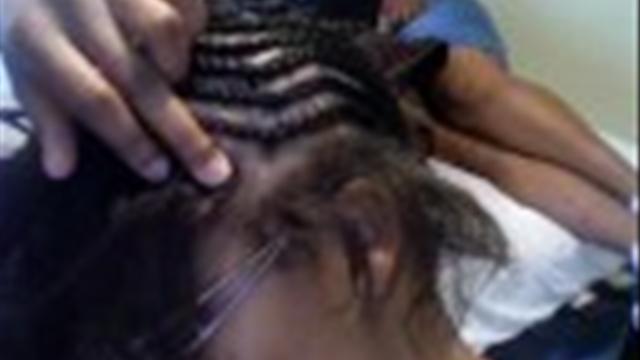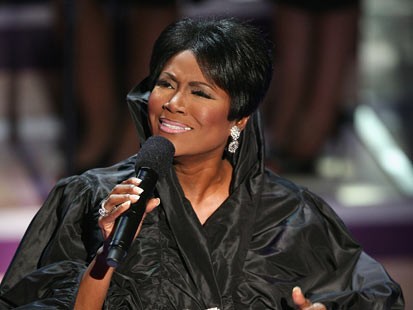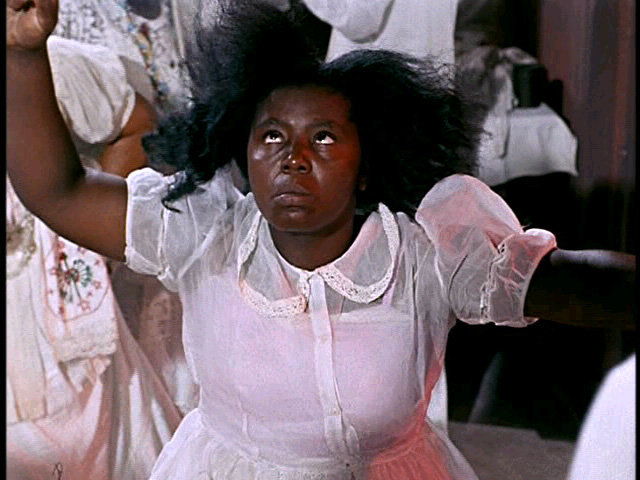- * To celebrate our anniversary month, some of us are revisiting previous posts from the past year and reflecting on them. I have chosen to reflect on “Single, Saved and Sexin’: The Gospel of Getting Your Freak On” because it was one of our most popular posts. Crunkashell’s truth telling and well-written argument inspired me to think about another Biblical edict that has shaped my life. I hope this frees you too.

- Unapologetically sewn-in.
Like most conservative, fundamentalist, literalist Christian folks, I grew up believing that getting your hair done was a sin—the only sin, in fact, that ever made God tell an angel to go to hell. For years, my grooming experiences were laden with guilt. I routinely went years at a time without getting my hair professionally done, until societal pressure would push me to give in to my urges. I couldn’t even enjoy all of the shocked faces at my high school prom because I just knew that if Jesus came back during the middle of a Luther song, I would burn in hell from the tips of my toes to the top of my perfectly coifed hair. I was caught in a continual cycle of high maintenance cuts, low maintenance care, trim, condition, rinse and repeat, topped off with five years of home hair care (if you can call what I did care). I treated hairstyling as if it were a bad habit that I desperately needed to break.

All of this is a prelude to a confession: I’m single. I’m saved (as in a born-again, my-name-is-on-the-list, goin-up-a-yonder Christian). And I have a sew-in. Unapologetically.
At my former church, I spent Saturday mornings (the time that many women spend in the hairdresser’s chair) with beautiful, dynamic, educated women whose heads were wrecks. We didn’t consider ourselves self-righteous; we were easy to be around and non-judgmental of each other. Together we prayed for the fallen sisters among us—the ones who missed a Saturday in sinful preparation for a Monday job interview. We also prayed for those who, in frustration, committed the most heinous sin of all: braids—the only hairstyle that the Bible explicitly denounces TWICE. We realized that they weren’t evil-hearted for their refusal to live by Christian standards: we prayed for an evil world that calls everyone to a standard of vanity that Paul and Peter both found appalling for women. More than anything, we prayed for the heterosexual men of God that our savior promised to send—men who would judge us by the content of our characters rather than the hair on our heads.

When we were teenagers making non-vanity pledges, we couldn’t have guessed that these promises would have such an effect on our romantic lives 10-20 years later. In fact, according to our worldview, our (lack of) hairstyles wasn’t the problem; the problem was with the sinful men who were attracted to the very vanity that God despised—the men who preferred long hair, short hair, natural hair—any style at all. We were convinced that we were doing the right thing and the rest of the world, though beautiful by man’s standards, was wrong.
I still respect the sisters who believe that and I believe that we serve the same God; I just no longer believe in their ethics of care. It is hard to live and thrive in a world that you know is gawking at your head. It’s hard to take the Bible as the gospel truth when black women are already policed in this society that is built on the fact of our deplorability. Do black women get a pass on the Bible’s vanity clause when they live in a society that demands it? Were not Paul’s words written to a people for whom “get up and go” hair was not a cause for consternation? What should black women do with their hair when we can neither cut it, style it, perm it, or God forbid, braid it? And were our ancestors living in sin for the hundreds of years that nimble fingers weaved intricate braids in the heads of women and men? I cannot serve a God who would turn someone away from His heaven for a hairstyle.

After all of these years, I’ve realized that the perfectly humble, holy hairstyle is not what I needed. I needed a bigger view of God.
For so many women, the biggest faith struggle is believing God for a male, heterosexual life partner. The women pray, serve, and refuse to apply makeup or comb their hair in hopes that God will send a spirit-filled, Word-educated man who was wildly attracted to their piety. Black women especially are attacked from both “the church” and “the world” about all the things we are doing that keep us single. The church says take off that makeup; men will think we are sex workers. The world, with the help of Queen Latifah, says we’d better not; men will think we are not nice or fun. The church says stay away from those demonic braids because they were a sign of sex work in Paul’s day. The world says get a sew-in—a style that requires braids—because real men dig Beyonce.
God is bigger than our understanding of Him. I have learned the limitations of my previous belief in the inerrancy of a text. Words, like any sign, are infinitely interpretable. Trying to nail down the single truth of a sign is an attempt by man to control a world that has always been out of control. Running from the hairdresser’s chair in a fit of guilt when she’d only finished half my perm felt better than coming to terms with cancer’s attack on my family. Walking the halls with my afro flat on one side made me feel righteous and important in a school that didn’t value us enough to give us new books. Shouting out of our hastily-done ponytails in church gave us joy in the face of the poverty we faced all week long. There are so many things that we cannot control; refusing to change my hair does not change this fact. It only blinds me to world-problems that I’d probably have the confidence to effect if I weren’t so caught up on this head of mine.
So hairstyling is back on the table for me. I have a sew-in. It’s luxurious. Underneath my sewn-in hair is a set of braids that would make my former Sunday School teacher speak in tongues. When my stylist patiently parted my tangled hair and gently braided it close to my scalp (but not too tight), I fell in love with her and refused to feel bad about it. My sew-in hides the sin of my braids, but one day I will feel bold enough to rock a fro-hawk or some other style that shows the extent to which I have “back-slid.” And that’s ok. I believe in a God who will love me anyhow.
That’s why I’m unapologetically single, saved, and sewn-in.


What is your denomination ashaf? I know you are Christian from the references to the Bible but the reason I’m asking is to get a better since of your beliefs. I’m a Christian as well (at least, I think).
I don’t want to offend you when I say this but I am at a loss as to how any religion could make sure a partial statement about hair that is directed to (Black) women, in particular. I give that whole “rule” a major side-eye. These patriarchal concepts are the same reason why women in the Middle East wear veils, hijabs, and burkas….they are just to further oppress women and have nothing to do with the word of God.
I will say this (and you can do your own research and then decide for yourself): The God I serve is not a human being, he is a spirit with a force greater than humanity itself. What we do with our hair matters not to God. It’s what we do with our hearts and minds which resonates with Him. God feels all of the energies we put out. If it makes you feel better to wear your hair a certain way, then do it and don’t be concerned with these boxed concepts which operate within religions. God gave you the freedom to think for yourself, don’t rely on anyone else to interpret Him for you. Get to know God yourself.
I think the post is meant to be taken as a satire on the hypocrisy of religious rules.
Thanks Lisa. I agree with you! This is just a riff on a previous post that garnered much attention from Christians who don’t share your beliefs (about the boxed concepts that shape some practices of Christianity) and are much more heavy-handed in their approach. Thanks for being so sweet!
i think it’s pointless to try to decipher Eurocentric religions such as Christianity. especially on issues such as hair when there are much more important issues one (black and brown ones; female ones) should spend their time and energy discerning.
I am truly laughing out loud. Still laughing. Long sigh. You know your satirical writing is good when you get real good responses. You are my PC Jr. (that’s Pearl Cleage Jr.) What’s up with the book of short stories?
the picture of the “holy hair” had me dead. there is nothing holy about that. i am curious to know what church this was? is this a seventh day adventist philosophy or jehovah’s witness? i single them out because they seem to be the most idealoigically conservative sects of the black religion. and you are right – it is complete and utter hypocrisy. AND it’s easier to hand these orders out when your hair is wash and wear. BUT in fairness, if Jesus had hair like wool it’s safe to assume some others did too, despite what the recreated pictures would have us believe. hmm. yall me thinking now…
Too bad the author, through all her growth found solace in a sewn-in weave rather than in learning to see the beauty in hair God pushed through her scalp. God made it beautiful, naturally.
cf, i <3 you!
(all smiles over here… & also s, s & s-i). 😉
regardless of religion, I liked a lot of hair … lol … seriously …